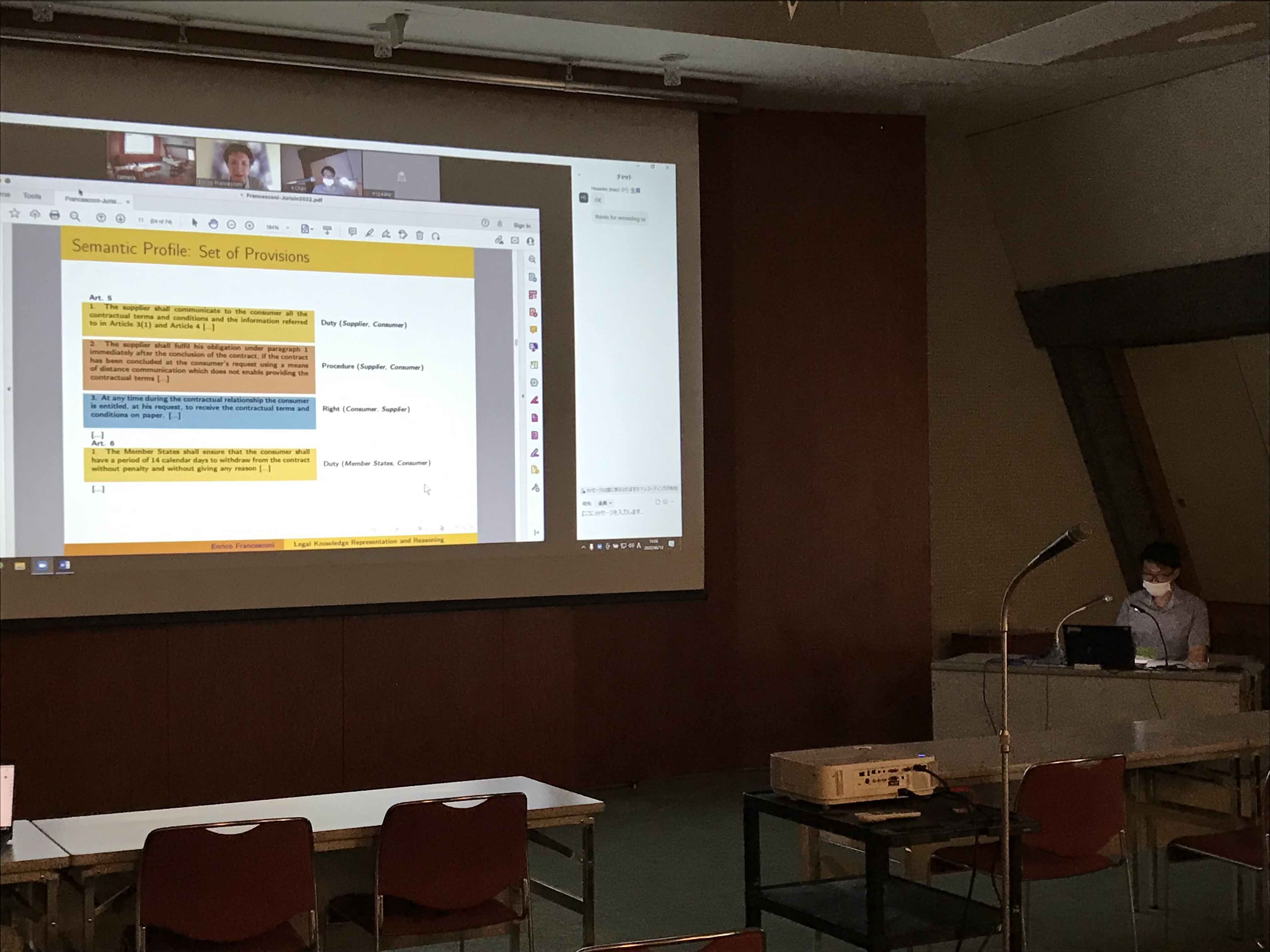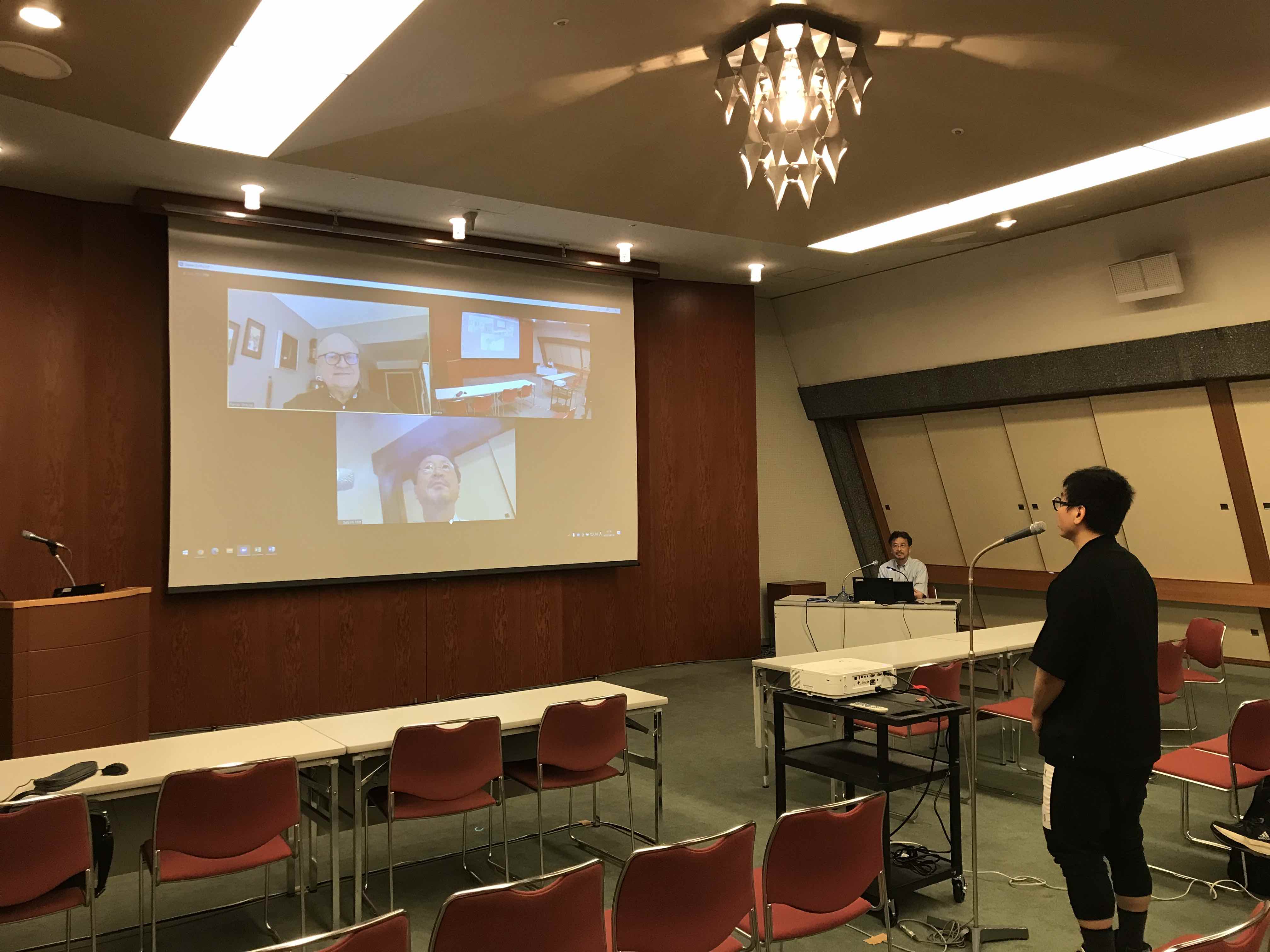Sixteenth International Workshop on Juris-informatics
(JURISIN 2022)
associated with JSAI International Symposia on AI 2022 (IsAI-2022)
June 13 - 14, 2022
New Information
We will contact you later regarding submission to the post-proceedings. (June 15, 2022)
Thank you! (June 15, 2022)
Invited talk by Prof. Enrico Francesconi (ONLINE)

Invited talk by Prof. Randy Goebel (ONLINE)

The Program has been modified. (June 9, 2022)
The tentative Program is now available. (June 6, 2022)
Notification has been sent. (May 16, 2022)
We are happy to announce that Enrico Francesconi, Researcher of IGSG-CNR, Italy and Randy Goebel, Professor of University of Alberta, Canada will give an invited talk. (Apr 6, 2022)
Due to many requests, the submission deadline has been extended to April 15, 2022. (Mar 29, 2022)
This website is open! (Dec 16, 2022)
Aims and Scope
Juris-informatics is a new research area which studies legal issues from the perspective of informatics. The purpose of this workshop is to discuss both the fundamental and practical issues among people from the various backgrounds such as law, social science, information and intelligent technology, logic and philosophy, including the conventional "AI and law" area. We solicit unpublished papers on theories, technologies and applications on juris-informatics.
Important Dates
Workshop: June 13 - 14, 2022Registration
Please register the workshop at registration page of JSAI International Symposia on AI 2022.
Topics
Relevant topics include, but are not limited to, the following:
- Model of legal reasoning
- Argumentation / Negotiation / Argumentation agent
- Legal term ontology
- Formal legal knowledge-base / Intelligent management of legal knowledge-base
- Translation of legal documents
- Computer-aided law education
- Use of Informatics and AI in law
- Legal issues on ubiquitous computing / multi-agent system / the Internet
- Social implications of use of informatics and AI in law
- Natural language processing for legal knowledge
- Verification and validation of legal knowledge systems
- Online dispute resolution
- AI and intellectual property
- Computer aided legal education
- Legal data mining
- Legal document analysis
- Legal information retrieval
- Legal information extraction
- Evidential reasoning
- AI application to forensics
- AI application to smart contracts and blockchain
- Legislation support by AI/IT techniques
- Any theories and technologies which is not directly related with juris-informatics but has a potential to contribute to this domain
Bar Exam Competition (COLIEE2022)
This year, JURISIN will co-located with the Seventh Competition on Legal Information Extraction/Entailment (COLIEE-2022). The motivation for the competition is to help create a research community of practice for the capture and use of legal information. Please visit the homepage of COLIEE2022 (http://www.ualberta.ca/~rabelo/COLIEE2022/) to see the detail of the competition.Invited Speakers
Enrico Francesconi (IGSG-CNR, Italy / ONLINE): Profiles of Legal Knowledge Representation and Reasoning in the Semantic Web
Randy Goebel (University of Alberta, Canada / ONLINE): What is required to capture legal knowledge for automated legal reasoning?
Submissions
Papers should be written in English, formatted according to the Springer Verlag LNCS style in a pdf form, which can be obtained from http://www.springeronline.com and not exceed 14 pages including figures, references, etc. If you use a word file, please follow the instruction of the format, and then convert it into a pdf form and submit it at the paper submission page. If a paper is accepted, at least one author of the paper must register the workshop and present it. We strongly encourage an online registration.
You can submit your paper at "https://easychair.org/conferences/?conf=jurisin2022".If you cannot submit a paper by EasyChair System by some trouble, please send email to:

Post Proceedings
Selected papers will be published as a post-proceedings via Springer Verlag LNAI after the second round of review after the workshop. Note that presentation at the workshop is a necessary condition for the selection.
The selected papers of the previous workshops were published as volumes of LNAI4914(JURISIN 2007), LNAI5447(JURISIN 2008), LNAI6284(JURISIN 2009) , LNAI6797(JURISIN2010), LNAI7258(JURISIN2011), LNAI7856(JURISIN2012), LNAI8417(JURISIN2013), LNAI9067(JURISIN2014), LNAI10091(JURISIN2015), LNAI10247(JURISIN2016), LNAI10838(JURISIN2017), LNAI11717(JURISIN2018), LNAI11717(JURISIN2018), LNAI12331(JURISIN2019), LNAI12758(JURISIN2020), and LNAIXXXXX (JURISIN2021)
JURISIN2022 Programme (June 13, 2022)
9:05-9:30 COLIEE 2022 Summary: Methods for Legal Document Retrieval and Entailment
Mi-Young Kim, Juliano Rabelo, Randy Goebel, Masaharu Yoshioka, Yoshinobu Kano and Ken Satoh
9:30-9:55 3B Billions of Parameters Are Worth More Than In-domain Training Data: A case study in the Legal Case Entailment Task
Guilherme Rosa, Luiz Henrique Bonifacio, Vitor Jeronymo, Roberto Lotufo and Rodrigo Nogueira
9:55-10:20 Semantic-based Classification of Relevant Case Law
Juliano Rabelo, Mi-Young Kim and Randy Goebel
10:20-10:50 Coffee Break
10:50-11:15 HUKB at the COLIEE 2022 Statute Law Task
Masaharu Yoshioka, Youta Suzuki and Yasuhiro Aoki
11:15-11:40 Less is Better: Constructing Legal Question Answering System by Weight Longest Common Subsequence of Disjunctive Union Texts
Minae Lin, Sieh-Chuen Huang and Hsuan-Lei Shao
11:40-12:05 SIAT@COLIEE-2022: Legal Case Retrieval with Longformer-based Contrastive Learning
Jiabao Wen, Zeyi Zhong, Yuelin Bai, Xiaoyan Zhao and Min Yang
12:05-12:30 JNLP team: Deep Learning Approaches for Tackling Legal Challenges in COLIEE 2022
Bui Minh-Quan, Nguyen Minh Chau, Dinh-Trung Do, Nguyen-Khang Le, Dieu-Hien Nguyen, Thi-Thu-Trang Nguyen, Minh-Phuong Nguyen and Nguyen Le Minh
12:30-14:00 Lunch
14:00-14:25 Using Textbook Knowledge for Statute Retrieval and Entailment Classification
Sabine Wehnert, Libin Kutty and Ernesto William De Luca
14:25-14:50 nigam@COLIEE-22: Legal Case Retrieval and Entailment using Cascading of Lexical and Semantic-based models
Shubham Kumar Nigam and Navansh Goel
14:50-15:50 Invited Talk I:
Enrico Francesconi (IGSG-CNR, Italy)
Title: Profiles of Legal Knowledge Representation and Reasoning in the Semantic Web
15:50-16:20 Coffee Break
16:20-16:45 DoSSIER@COLIEE2022: Dense retrieval and neural re-ranking for legal case retrieval
Amin Abolghasemi, Sophia Althammer, Allan Hanbury and Suzan Verberne
16:45-17:10 LeiBi@COLIEE 2022: Aggregating Tuned Lexical Models with a Cluster-driven BERT-based Model for Case Law Retrieval
Arian Askari, Georgios Peikos, Gabriella Pasi and Suzan Verberne
17:10-17:35 Legal Textual Entailment using Ensemble of Rule-based and BERT-based method with Data Augmentations including Generation without Excess or Deficiency
Masaki Fujita, Takaaki Onaga, Ayaka Ueyama and Yoshinobu Kano
17:35-18:00 Statute-enhanced lexical retrieval of court cases for COLIEE 2022
Tobias Fink, Gabor Recski, Wojciech Kusa and Allan Hanbury
JURISIN2022 Programme (June 14, 2022)
9:30-10:30 Invited Talk II:Randy Goebel (University of Alberta, Canada)
Title: What is required to capture legal knowledge for automated legal reasoning?
10:30-11:00 Mining data to measure a “fair justice”: A conceptual data-driven approach
Joao Araujo Monteiro Neto, Vasco Furtado, Fernando Siqueira, Francisco Das Chagas Jucá Bomfim, André Câmara Ferreira da Costa and Ana Lourdes Teixeira Matos
11:00-11:30 Differential-aware Transformer for Partially Amended Sentence Translation
Takahiro Yamakoshi, Yasuhiro Ogawa and Katsuhiko Toyama
11:30-13:00 Lunch
13:00-13:30 Text Classification of Modern Mongolian Legal Documents
Garmaabazar Khaltarkhuu, Biligsaikhan Batjargal and Akira Maeda
13:30-14:00 Mapping Similar Provisions between Japanese and Foreign Laws
Hiroki Cho, Aki Shima and Makoto Nakamura
14:00-14:30 Effects of Relations between Normal Logic Programs and Defeasible Logic Programs on Contrary Prioritized Priority
Wachara Fungwacharakorn, Kanae Tsushima and Ken Satoh
14:30-15:00 Named Entity Recognition on Judgments of High Courts in India
Rishabh Singhal, Sanyukta Tanwar and Kshitiz Verma
15:00-15:30 Coffee Break
15:30-16:00 A Comparative Study of BERT and Legal-BERT for the Prediction of Indian Legal Case Judgements
Dr. Anukriti Bansal, Aman Jain, Himanshu Goyal and Vikas Bajpai
16:00-16:30 Estimating Time to Clear Pendency of Cases in High Courts in India using Linear Regression
Kshitiz Verma, Anshu Musaddi, Ansh Mittal and Anshul Jain
16:30-17:00 Legal aspects of the use of continuous-learning models in Telemedicine
Chiara Gallese
17:00-17:30 Argumentation Schemes for Blockchain Deanonymization
Dominic Deuber, Jan Gruber, Merlin Humml, Viktoria Ronge and Nicole Scheler
17:30-17:35 Closing
Workshop Chairs
Makoto Nakamura, Niigata Institute of Technology, Japan
Satoshi Tojo, Japan Advanced Institute of Science and Technology(JAIST), Japan
Steering Committee Members
Yoshinobu Kano, Shizuoka University, Japan
Takehiko Kasahara, Toin University of Yokohama, Japan
Nguyen Le Minh, Japan Advanced Institute of Science and Technology, Japan
Makoto Nakamura, Niigata Institute of Technology, Japan
Yoshiaki Nishigai, Chiba University, Japan
Katsumi Nitta, National Institute of Informatics, Japan
Yasuhiro Ogawa, Nagoya University, Japan
Seiichiro Sakurai, Meiji Gakuin University, Japan
Ken Satoh, National Institute of Informatics and Sokendai, Japan
Satoshi Tojo, Japan Advanced Institute of Science and Technology(JAIST), Japan
Katsuhiko Toyama, Nagoya University, Japan
Masaharu Yoshioka, Hokkaido University, Japan
Advisory Committee Members
Trevor Bench-Capon, The University of Liverpool, UK
Henry Prakken, University of Utrecht & Groningen, The Netherlands
John Zeleznikow, Victoria University, Australia
Robert Kowalski, Imperial College London, UK
Kevin Ashley, University of Pittsburgh, USA
Program Committee Members (Tentative)
Thomas Ågotnes, University of Bergen, Norway
Michał Araszkiewicz, Jagiellonian University, Poland
Ryuta Arisaka, National Institute of Informatics, Japan
Marina De Vos, University of Bath, UK
Juergen Dix, Clausthal University of Technology, Germany
Kripabandhu Ghosh, Indian Institute of Technology Kanpur, India
Saptarshi Ghosh, Indian Institute of Technology Kharagpur, India
Randy Goebel, University of Alberta, Canada
Guido Governatori, CSIRO, Australia
Tokuyasu Kakuta, Chuo University, Japan
Yoshinobu Kano, Shizuoka University, Japan
Takehiko Kasahara, Toin University of Yokohama, Japan
Mi-Young Kim, University of Alberta, Canada
Nguyen Le Minh, JAIST, Japan
Makoto Nakamura, Niigata Institute of Technology, Japan
María Navas-Loro, Universidad Politécnica de Madrid
Yoshiaki Nishigai, Chiba University, Japan
Tomoumi Nishimura, Osaka University, Japan
Katsumi Nitta, NII, Japan
Yasuhiro Ogawa, Nagoya University, Japan
Monica Palmirani, CIRSFID, Italy
Ginevra Peruginelli, IGSG-CNR, Italy
Juliano Rabelo, University of Alberta, Canada
Julien Rossi, Amsterdam Business School
Seiichiro Sakurai, Meiji Gakuin University, Japan
Ken Satoh, National Institute of Informatics and Sokendai, Japan
Jaromir Savelka, Carnegie Mellon University
Yunqiu Shao, Tsinghua University
Akira Shimazu, JAIST, Japan
Kazuko Takahashi, Kwansei Gakuin University, Japan
Yoichi Takenaka, Kansai University, Japan
Satoshi Tojo, JAIST, Japan
Katsuhiko Toyama, Nagoya University, Japan
Vu Tran, The Institute of Statistical Mathematics, Japan
Josef Valvoda, University of CambridgeSabine
Wehnert, Otto-von-Guericke-Universität Magdeburg
Yueh-Hsuan Weng, Tohoku University, Japan
Hannes Westermann, University of Montreal
Hiroaki Yamada, Tokyo Institute of Technology, Japan
Takahiro Yamakoshi, Nagoya University, Japan
Masaharu Yoshioka, Hokkaido University, Japan
Related Links
Preivous JURISIN workshops
- JURISIN2007
- JURISIN2008
- JURISIN2009
- JURISIN2010
- JURISIN2011
- JURISIN2012
- JURISIN2013
- JURISIN2014
- JURISIN2015
- JURISIN2016
- JURISIN2017
- JURISIN2018
- JURISIN2019
- JURISIN2020
- JURISIN2021
For any inquiry concerning the workshop, please send it to 
JURISIN 2022 home page https://www.niit.ac.jp/jurisin2022/
